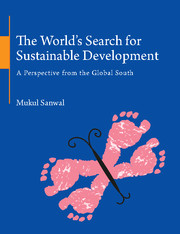Book contents
- Frontmatter
- Dedication
- Contents
- Preface
- Acknowledgments
- Abbreviations
- INTRODUCTION
- 1 Social Dimension of Sustainability
- CONSUMPTION IN AN UNEQUAL WORLD: FRAMING INTERNATIONAL COOPERATION
- CLIMATE POLICY: GLOBAL TO NATIONAL
- SUSTAINABLE DEVELOPMENT: NATIONAL TO GLOBAL
- 12 Conceptual and Institutional Foundation
- 13 Politics within the United Nations
- 14 Limitations of the Building Blocks of Sustainability
- 15 Use of Natural Resources
- 16 Distribution of Natural Resources
- CONSUMPTION IN A MORE EQUAL WORLD: SHAPING SOCIETAL FUNCTIONS
- GEOPOLITICS TO GEOECONOMICS: RURAL–URBAN DIVIDE, RATHER THAN BETWEEN COUNTRIES
- THE ASIAN CENTURY
- Index
13 - Politics within the United Nations
from SUSTAINABLE DEVELOPMENT: NATIONAL TO GLOBAL
Published online by Cambridge University Press: 18 December 2015
- Frontmatter
- Dedication
- Contents
- Preface
- Acknowledgments
- Abbreviations
- INTRODUCTION
- 1 Social Dimension of Sustainability
- CONSUMPTION IN AN UNEQUAL WORLD: FRAMING INTERNATIONAL COOPERATION
- CLIMATE POLICY: GLOBAL TO NATIONAL
- SUSTAINABLE DEVELOPMENT: NATIONAL TO GLOBAL
- 12 Conceptual and Institutional Foundation
- 13 Politics within the United Nations
- 14 Limitations of the Building Blocks of Sustainability
- 15 Use of Natural Resources
- 16 Distribution of Natural Resources
- CONSUMPTION IN A MORE EQUAL WORLD: SHAPING SOCIETAL FUNCTIONS
- GEOPOLITICS TO GEOECONOMICS: RURAL–URBAN DIVIDE, RATHER THAN BETWEEN COUNTRIES
- THE ASIAN CENTURY
- Index
Summary
Setting the agenda
The economic model of industrialization–urbanization led to the environment as an input to be used and exploited for human well-being, defined as increasing production, and it was only in the 1970s with the fear that modern science may not be able to resolve the concern with substitution and that the pattern of economic growth was damaging the environment that scarcity was first raised as a global concern [Meadows et al., 1972]. The term sustainable development was first used in the World Conservation Strategy with a focus on environmental damage [IUCN, UNEP, WWF, 1980]. During most of the late twentieth century, sustainable development evolved as a set of observations about nature, and the relations of humans with it, but it was clear to many that the key to understanding this lay in the relationships reviewing consumption and production patterns, that is, how human society was evolving in its use of natural resources as a consequence of the industrial revolution and urbanization. As the sustainability debate became more mainstream in the 1980s, much of it was influenced by economics and the move to translate environmental choices into market preferences. A necessary addition was the need for measurement, and as the emphasis shifted to practical ways in which sustainability could be incorporated into existing policies and structures, policy professionals and business began to take an interest in the dialogue.
The growing environmental concerns soon became part of the mainstream debates on development and economics, without resolving the two main ambiguities in the definition relating to socio-economic needs and environmental stability. The notion of ‘sustainable growth’ was criticized as ‘an oxymoron in a world where ecosystems are finite’ [Daly, 1993]. At the same time, natural and manufactured capital were seen as interchangeable with technology filling human produced gaps, and the success in dealing with the depletion of the ozone layer modifying production and consumption patterns tended to support this view. While the World Conservation Strategy, 1980, concentrated entirely on environmental damage without discussing socio-economic concerns, their 1991 report [IUCN et al., 1991], although still concentrating on environmental issues considered social issues proposing increasing participation in decisions, improving the quality of human life and modifications to the world economy.
- Type
- Chapter
- Information
- The World's Search for Sustainable DevelopmentA Perspective from the Global South, pp. 179 - 193Publisher: Cambridge University PressPrint publication year: 2015

